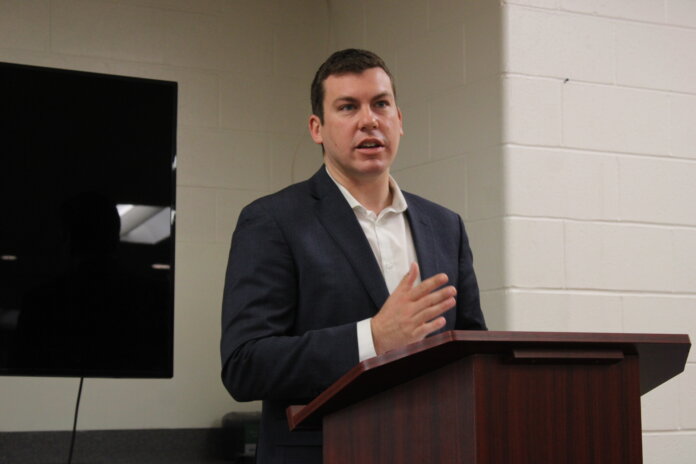
LANTZ: Kings-Hants MP Kody Blois spoke with members of the local business community during the Business Breakfast Meeting, hosted by the East Hants & Districts Chamber of Commerce.
The meeting was held in the Todd Hunter Room at the East Hants Sportsplex and was attended by approximately 25 business owners in the municipality.
Blois went through the highlights of the budget and then opened the floor for questions. There were several questions, and he answered most. The ones he could not he was taking back to his colleagues in the respective departments to get answers and follow up on.

The following is the summary of the key budget items from the session, as shared by the Chamber in a newsletter to members:
The Canadian government announced the 2022 federal budget, April 7, 2022. The full document can be found online at https://budget.gc.ca/2022/home-accueil-en.html. If you download the PDF version and use the Ctrl + F function, you can search these terms for more information about each program.
HOUSING
- New Housing Accelerator Fund – Budget 2022 proposes to provide $4 billion over five years, starting in 2022-23, to the Canada Mortgage and Housing Corporation to launch a new Housing Accelerator Fund to create 100,000 net new housing units over the next five years by working with municipalities to expedite development.
- Rapid Housing Initiative – $1.5 billion over two years to extend the Rapid Housing Initiative, creating at least 6,000 new affordable housing units, with at least 25% of funding going towards women-focused housing projects.
- Co-Investment Housing Fund – This will accelerate the creation of up to 4,300 new units and the repair of up to 17,800 units for the Canadians who need them most.
- Indigenous Housing – Providing $4 billion over seven years to accelerate work in closing Indigenous housing gaps, including $2.4 billion over five years to support First Nations housing on reserves.
- Multigenerational Home Renovation Tax Credit – Introducing a Multigenerational Home Renovation Tax Credit, which would provide up to $7,500 in support for constructing a secondary suite for a senior or an adult with a disability.
- Tax-Free First Home Savings Account – Introducing the Tax-Free First Home Savings Account that would give prospective first-time home buyers the ability to save up to $40,000. Like an RRSP, contributions would be tax-deductible, and withdrawals to purchase a first home—including investment income— would be non-taxable, like a TFSA. Tax-free in, tax-free out.
- First-Time Home Buyers’ Tax Credit – Double the First-Time Home Buyers’ Tax Credit amount to $10,000. The enhanced credit would provide up to $1,500 in direct support to home buyers.
- Home Buyers’ Bill of Rights – Moving forward on the Home Buyers’ Bill of Rights to get rid of blind bidding, make home inspections a requirement and ban foreign buying.
- ADVERTISEMENT:
CLIMATE, MINING & AGRICULTURE
- Rental Construction Financing Initiative (RCFI) – Developers who significantly exceed energy efficiency requirements and build highly affordable and energy-efficient units will be eligible to have a portion of their repayable loans converted to nonrepayable loans.
- Deep Retrofit Accelerator Initiative – Providing support for retrofit audits and project management for large projects to accelerate the pace of deep retrofits in Canada, including a focus on low-income affordable housing.
- Canada Growth Fund – Establishing the Canada Growth Fund to attract substantial private sector investment to help meet important national economic policy goals.
- Canadian Innovation and Investment Agency – Creating the Canadian Innovation and Investment Agency and supporting its initial operations with $1 billion to proactively work with new and established Canadian industries and businesses to help them make the investments they need to innovate, grow, create jobs, and be competitive in the changing global economy.
- Supporting Critical Minerals Projects in Canada – Providing up to $1.5 billion over seven years to support the development of the critical minerals supply chains, with a focus on priority deposits.
- Strategic Innovation Fund – Providing up to $1 billion over six years, combined with $500 million drawn from existing program funding, this will provide $1.5 billion in targeted support for critical minerals projects to increase the production of goods like electric vehicles and batteries, with prioritization given to manufacturing, processing, and recycling applications.
- Electric Vehicles – Investing over $900 million to continue building a national network of electric vehicle charging stations across Canada and providing $547.5 million over four years to launch a new purchase incentive program for medium- and heavy-duty zero-emission vehicles.
- Atlantic Loop – Advancing work on the Atlantic Loop project to support the expansion of clean electricity in Canada.
- Canadian Agricultural Partnership – Renewing the Canadian Agricultural Partnership to support agricultural innovation, sustainability, competitiveness, market development and a comprehensive suite of business risk management programs that help Canadian farmers.
- Full and Fair Compensation for Supply Managed Sectors – Working with sector representatives, the government will announce full and fair compensation for the supply-managed sector related to the new NAFTA in the 2022 fall economic and fiscal update.
- Temporary Foreign Worker Program – Introducing a Trusted Employer Model that reduces red tape for repeat employers who meet high standards and investing $64.6 million to increase capacity to process employer applications.
- Agriculture and Fish Processing – Tailored to the unique needs of these employers and workers, a new foreign labour program will be implemented and regularly reviewed for its impact on local labour markets to maximize the employment of Canadians and permanent residents.
- Fighting and Managing Wildfires – Proposing additional action to counter the growing threat of wildfires in Canada by helping provinces, territories and First Nations communities procure firefighting equipment, and operate a new satellite monitoring system.
BUSINESS SUPPORTS
- Cutting Taxes for Canada’s Growing Small Businesses – Phasing out access to the small business tax rate more gradually, with access to be fully phased out when taxable capital reaches $50 million, rather than $15 million.
- Reducing Credit Card Transaction Fees – Continuing current consultations with stakeholders on solutions to deliver on our commitment to lower the cost of credit card fees in a way that benefits small businesses.
- Supporting Canada’s Innovation Clusters – Providing $750 million over six years to support the further growth and development of Canada’s Global Innovation Clusters, including the Ocean Supercluster project here in Atlantic Canada.
- Strengthening Canada’s Trade Remedy and Revenue Systems – Introducing amendments to the Special Import Measures Act and the Canadian International Trade Tribunal Act to strengthen Canada’s trade remedy system by better ensuring unfairly traded goods are subject to duties and increasing the participation of workers.
- Labour Mobility Deduction for Tradespeople – Introducing a Labour Mobility Deduction, which would provide tax recognition on up to $4,000 per year in eligible travel and temporary relocation expenses to eligible tradespersons and apprentices.
HEALTH CARE & AFFORDABILITY
- Foreign Credential Recognition Program – Providing $115 million over five years, with $30 million ongoing, to expand the Foreign Credential Recognition Program to reduce red tape and help up to 11,000 internationally trained health care professionals per year get their credentials recognized and find work in their field in Canada.
- Loan Forgiveness for Doctors and Nurses in Rural Communities – Increasing the maximum amount of forgivable Canada Student Loans by 50%. This will mean up to $30,000 in loan forgiveness for nurses and up to $60,000 in loan forgiveness for doctors working in underserved rural or remote communities.
- Reducing the Backlogs of Surgeries and Procedures – Providing provinces and territories with an additional $2 billion through a top-up to the Canada Health Transfer to address backlogs.






























